Showing 49–60 of 296 results
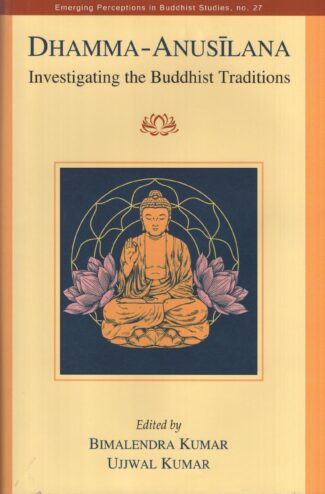
This book is an anthology of seventeen cerebral articles from well-known Buddhist scholars associated with major universities across the globe deliberating many a topic associated with Buddhist religion and its philosophies as part of our constant striving to understand the fundamental nature of what the Buddha wanted us to realize.
There have been serious attempts to understand the Buddha and his teachings since the inception of Buddhism some 2,600 years ago. All through the history of Buddhism, scholars were constantly striving to understand the fundamental nature of what the Buddha wanted us to realize. This book is an anthology of seventeen cerebral articles from well-known Buddhist scholars associated with major universities across the globe. In four parts – Meditation; Personality and Position; Dharmakirti and Persons; and Principles, History and Grammar – it highlights some pertinent topics associated with Buddhism and its legacy.
Part I discusses the diverse dimensions of meditation, dedicating itself to the kiriya (action) aspects of Buddhism. Part II is an attempt to delineate and study the major branches of Buddhism. Part III deliberates on the contributions of Dharmakirti and Rahula Sankrtyayana to the Buddhist philosophy along with the concept manusa-panatipata and how the revelation of reality of human experience by analysis helps a person to achieve wisdom in the light of Majjhima Nikaya Anathapindikovadasutta. Part IV has papers on different philosophical and applied concepts of Buddhism.
This volume thus should benefit one in understanding many an aspect of Buddhism vis-à-vis its enormous corpus of literature and teachings. It should highly benefit the students of Buddhism and for those who are keen to fathom deep into the myriad topics of Buddhist philosophy and teachings.
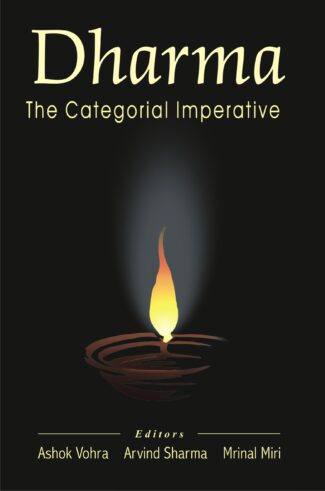
This book presents an in-depth study of the concept of dharma and acknowledges that Indian reality encompasses the elements of religion and dharma. It explores an alternative understanding of Indian civilization, independent of Western presuppositions as well as some contemporary issues relating to women and the dilemmas faced by the Indian diaspora.
Each stable culture and major civilization of the world consists of a distinct material base and a distinct ideational structure and has an inherent mechanism of striking its own equilibrium between the two. In the Indian tradition dharma is the balancing force. Religion and ideology are literally treated as synonymous with the Sanskrit word dharma. But dharma differs from religion in not being exclusive, and from ideology in possessing a transcendental dimension. The papers in this volume acknowledge that neither the word religion nor dharma can be discarded while looking at the Indian reality. They address themselves to the question: To what extent does the continued use of the concept of religion in the Indian context reflect reality, and to what extent does it distort or misrepresent its dhàrmic reality? Given India’s historical and the present existential situation these papers explore the question: Is an alterative understanding of Indian civilization possible, independent of Western presuppositions? The articles in the book present an in-depth study of the concept of dharma and its relation to the other purusharthas artha, kama and moksha, as well as with society, science, religion, Ayurveda and secularism. Relying mainly on the Vedas, epics, Manusmriti and the writings of Plato, Vivekananda, Gandhi et al., these papers explore some contemporary issues relating to women (stri-dharma) and the dilemmas faced by the Indian diaspora, especially in the UK and the US. These discussions have an appeal for a general reader as well as for scholars of Philosophy, Religion, Women’s Studies, Modern India and Sociology.
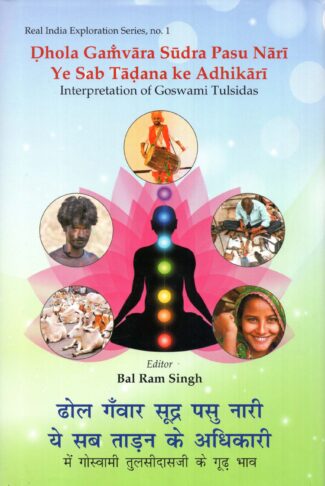
This book presents a proper meaning of the Ramcharitmanas chaupai, Dhola gamvara sudra pasu nari , ye sab tadana ke adhikari using the actual meaning of the word, tadana, in Avadhi language, and by delving into the deep philosophical references of the Pancabhutas, ether, air, fire, water, and earth of the Samkhya and Vaishesika darshanas, as intended by Goswami Tulsidas.
This book presents a proper meaning of the Ramcharitmanas chaupai, Dhola gamvara sudra pasu nari , ye sab tadana ke adhikari using the actual meaning of the word, tadana, in Avadhi language, and by delving into the deep philosophical references of the Pancabhutas, ether, air, fire, water, and earth of the Samkhya and Vaishesika darshanas, as intended by Goswami Tulsidas.

In this book, Nataraja Guru, a disciple of the Great Narayana Guru, explains the dialectical methodology and applies it to understand the relationaship between man and woman, Proto-language and Meta-language and romance and tragedy in Eastern and Western literature.
Dialectics is the implicit method of Upanishadic literature. It is also used as a critique for yielding a superior unitive understanding in works like the Bhagavad Gita and the Yoga-Vasishistha. In the West, dialectical methodology originated around the fifth century bce, and has been used in varying ways by classical thinkers, later Christian theologians, and modern philosophers like Kant, Fichte, Hegel, Karl Marx and Friedrich Engels. The writings of Nataraja Guru provide an integrated vision of the Eastern and Western traditions of dialectics. As such, he offers an unitive understanding of philosophy by way of a more comprehensive methodology of dialectics.
In the book, Nataraja Guru explains the basics of dialectical methodology, and applies it towards a superior understanding of the relation between man and woman, between proto-language and meta-language (bearing reference to Indian iconography), and between romance and tragedy as found in literature. He also applies dialectics in order to study social problems, but in a way that varies from Hegel, Marx and Engels. He further reveals the significance of the value system found in small, primitive communities, and upholds the eternal values of coexistence, unity and collective security. In particular, this volume provides a window for examining Nataraja Gurus overall position as a philosopher and his unitive teachings in general. In this regard it will be valuable for philosophers and scholars as well as the general reader.
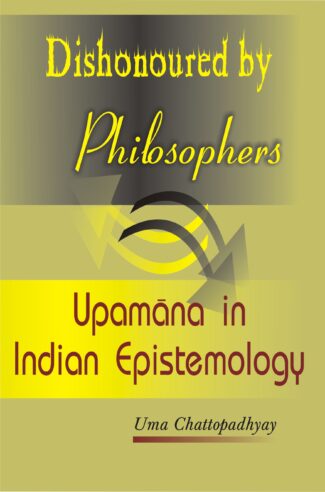
The volume is a study of the importance of upamana (knowledge by analogy) in Indian epistemology, with special focus on the Nyaya (and Mimamsa) positions on upamana and the usefulness of upamana as stressed by the Naiyàyikas. It highlights also the views of some schools against upamana as such.
The volume is a study of the importance of upamana (knowledge by analogy) in Indian epistemology. The two stalwart schools of Nyaya and Mimamsa admit the relevance of upamana but differ with regard to many things including the object of knowledge by upamana.
This book explores the way Naiyayikas and the Mimamsakas differ on some major points with reference to upamana in their very definition of upamana, for instance. The focus is on the Nyaya position on upamana and the usefulness of upamana as stressed by the Naiyayikas. The analytic study by the dialectical method explains the classical Nyaya view of upamana of Gautama and his followers and then the classical Mimamsa views. It considers the views of Naiyayikas Jayanta Bhatta and Udayanacarya to show how much the Naiyayikas were logical in accepting a particular view on upamana. It gives the views of some other schools including the Bauddha and Vaiseshika schools against upamana as such and against Nyaya and Mimamsa views of upamana in particular. Throughout, a number of philosophical scholars and their original texts spread over many centuries are examined.
The book will interest scholars and students of Indian philosophy.
DRISHTIPAAT, is a glimpse into the life and times of the three great saints of Ishvar Ashram, Nishat, Srinagar Kashmir. This book makes their presence felt all around us. The pictorial journey, takes the reader, in the serene and benign presence of the great Shaiva master Shree Lakshman Joo, Devi Sharika Ji and Devi Prabha Ji. Their drishti (glance), through the pictures, and shlokas make readers drench with the Divine Grace and their blessings.
Philosophy in this set of two volumes is a cognitive activity par excellence. Cognition is that the language expresses and it reveals intelligible objects/beings of language and the meaning to which our philosophical reflections, investigations, analysis and interpretation are not only based on but are confined to. The work is fit for satisfying the intellectual hunger of those who are sick of reading the same metaphysical, ontological, theological and epistemological descriptions in different books of history of philosophy, Indian and Western, to those searching a philosophy free from our captive thinking and also an innovative vision to meet out the new challenges in philosophy. Concentrating on cognition as it flashes by language the book analyses, discusses, interprets and critically argues most of the philosophical issues and their responses by Indian and Western philosophical traditions well conclusively.
Unlike linguistic and analytic philosophies, the book is a philosophy of language. Unlike meaning-centric philosophies popular in the East and West, the language-centric approach of the book is based on the expressive nature of language. Based on cognition as it flashes, on active theory of knowledge and action-oriented view of language and its meaning, it reflects on problems, doubts, paradoxes and queries for clarity and resolve, and on that basis, utility and future of philosophy as well.
Against philosophy as subjective and objective thinking, it is a cognitive reflection par excellence. These volumes cover the courses of philosophy prescribed in the universities and colleges useful for scholars and students and those who want a fresh perception to come up with the new challenges in philosophy.
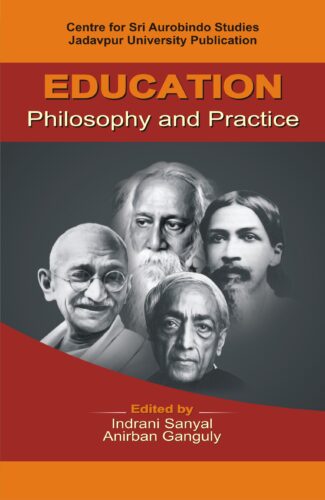
The book elaborates and analyses various strands of Sri Aurobindo’s thoughts on education. It also explores classical Indian model for education, with the viewpoints of some of his distinguished contemporaries like Rabindranath Tagore, Mahatma Gandhi, J. Krishnamurti and others.
The anthology Education: Philosophy and Practice, an academic initiative of the Centre for Sri Aurobindo Studies, Jadavpur University, elaborates and analyses various strands of Sri Aurobindo’s thoughts on education. Sri Aurobindo divorced from history (especially from the very political atmosphere of the period, when it was a colonial India) is difficult to situate. The present study, keeping Sri Aurobindo’s ideas on education central to it, also explores classical Indian model of education, the Bengal National model for education and also explores viewpoints of some of his distinguished contemporaries like Rabindranath Tagore, Mahatma Gandhi, Jiddu Krishnamurti, Sister Nivedita, Ananda Coomaraswamy and others. Sri Aurobindo, as a practical guide, as an acarya in the typical classical Upanisadic model, had far-reaching influences upon his disciples. This volume is an eye-opener for the subject on professional ethics for teachers and on the inter-personal relation between the teacher and student. The present volume consists of twelve essays which are analytic, informative and is lucid in style. This is a well-rounded text for students and an essential reference for researchers. This volume is surely helpful in the domain of Sri Aurobindo Studies.
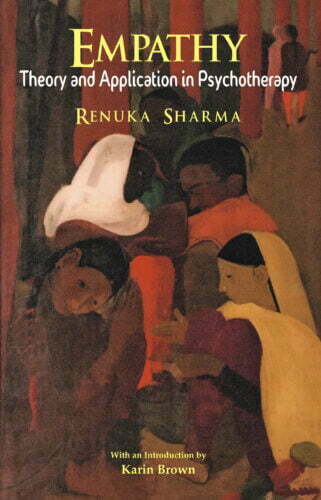
Empathy is quite often misunderstood as sympathy. It has its cognate in the Eastern or contemplative practice of compassion (karuna, metta, krpa) toward another, and also to sorge or care in phenomenological hermeneutics. The book demonstrates the way in which using empathy as a means of diagnosis leads to different, more successful results and course of action in psychoanalysis.
Empathy is a term much used in popular culture and professional circles. Yet it remains one of the most misunderstood tropes. Most people confuse or conflate empathy with sympathy; though related, these involve somewhat radically different affective or psychological registers. Empathy is founded on the art of understanding a living being’s particular mental state or inner condition, in respect of his/her predicament, pain, suffering, anguish, fear, grief, sorrow, frustration, and anger in certain trying circumstances. There can even be comportment with another’s joy and exhilaration. Its proper use makes possible a much deeper understanding of human communication, relation, intentionality, and action. As such its cognate in the Eastern or contemplative practice of compassion (karuna, metta, kripa) toward another, and also to sorge or care in phenomenological hermeneutics. Thus, there are cognitive, affective and ethical components in the practice of empathy.
The importance of empathy whether in everyday life or as a clinical tool in therapeutic and palliative settings cannot be more emphasized. The book demonstrates the way in which using empathy as a means of diagnosis leads to different, more successful results and course of action. In so doing, the study challenges the erstwhile neglect and misconception of the role of empathy in transference and introspective processes availed in psychoanalysis.
The book introduces novices in the field to the rich literature of psychoanalysis and philosophy, combining conceptual phenomenology with empirical data collected in a clinical setting. Testing the theory against clinical cases, as the book engages with, lends itself to a more solid conceptualization that can be poignantly articulated and studied further. The book will benefit students and practitioners in counselling, social work, psychiatry, psychoanalysis, psychotherapy and philosophy.
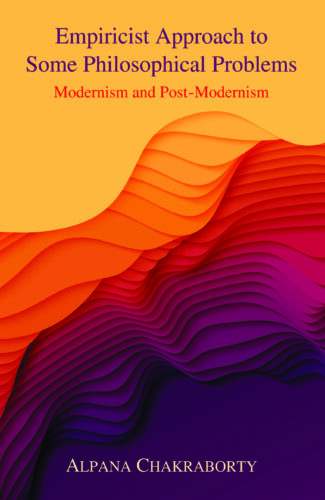
The book carefully examines and analyses the empirical tradition from different angles and concludes that modern and post-modern philosophy is actually a development from rationalism to empiricism, from the viewpoint of Francis Bacon, Thomas Hobbes, John Locke, George Berkeley, David Hume, John Stuart Mill, Edmund Husserl, Bertrand Russell and Ludwig Wittgenstein.
“This book is an attempt to give a historical account of the development of the empirical thoughts. It discusses issues related to the sources and the methods of knowing and highlights the views of the prominent empirical philosophers such as Thomas Hobbes and Francis Bacon up to Wittgenstein and the logical positivists. It takes up the issues related to the universals and inquires “Is there anything that is universal?” and if so, “Is universe knowable?”. The nominalist views of Thomas Hobbes and John Locke are taken up to establish the empiricist claim that “universals cannot exist without the particulars”. The important question “How do we determine the criteria of personal identity?” is taken up by John Locke and David Hume. Locke’s view that, “it is the same consciousness which constitutes personal identity”, but Hume rejects the idea of the permanent self. The criticisms for and against Locke and Hume are discussed herein in detail. The Berkeleian idealistic position that “only ideas of the mind are real” and the phenomenalistic position of Kant that “sense perception exists even when the object is not present in front of the perceivers eye” have both supportive and counter arguments which are discussed in detail. A critical analysis of Kantian theory of knowledge with the help of the two dogmas of empiricism has also been discussed.”

The book presents a detailed comparison of process philosophy and Màdhyamika Buddhism, analysing the similarities and differences between the two. It attempts a creative integration between the two and introduces a new philosophy, Process Buddhism.
The book presents a detailed comparison of process philosophy and Madhyamika Buddhism, analysing the similarities and differences between the two. It attempts a creative integration between the two and introduces a new philosophy, Process Buddhism. Process thought underscores the view that reality is a cumulative process of perspectival and experiential events. Peter Kakols work, in a remarkable foray into this area of philosophy, shows that the Madhyamika teaching, which essentially stresses the emptiness of emptiness, and process theory of worldviews are not incompatible with each other but are rather complementary aspects of the same theory.
In this meticulous work where the analysis involves careful exposition of both sides, Kakol notes that the fundamental compatibility between them is that both views become contradictory if seen as independent and so must be constantly transcended in a process of gradual purification and de-reification (or nominalisation). Kakol reveals an ability to situate process philosophy and Madhyamika Buddhism in the context of larger movements, both in their times of origin and now. He examines the views of not just Buddhist scholars and process philosophers but a range of social and political thought too.
The work will fascinate scholars and students of Process Philosophy and Madhyamika Buddhism.
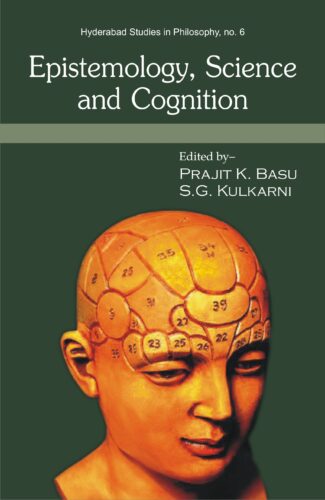
This book is a collection of research papers focussing on the phenomenon of cognition from the epistemological point of view in the light of the linguistic and the congnitivist shift in philosophy in general and in philosophy of science in particular.
The papers collected in this volume focus on the phenomenon of cognition from the epistemological point of view in the light of the linguistic and the cognitivist shift in philosophy in general and in philosophy of science in particular.
The recognition that psychology and cognitive science are central to the epistemological enterprise has led to a shift in the locus of evaluation from knowledge claims to belief formation in individual knowers. Psychological processes thus become primary objects of epistemic evaluations. The questions then are: (1) How are these processes to be evaluated?; (2) Given the limitations of a cognitive agent, how reliable are the methods employed by the cognitive architecture of the agent?; (3) How can the notion of reason and rationality be reconfigured so as to be tied to the new epistemology?; (4) Does the cognitivist approach help us to transcend the normativist-naturalist dichotomy?; (5) What light does the new approach shed on the rules of scientific and day-to-day reasoning?; (6) What is the significance of the new developments in epistemology in relation to the nature and limits of modelling as the basis of science as a cognitive enterprise. In dealing with these and similar other questions, the papers shed light upon the core concepts of epistemology (Western and Indian) such as concepts of meaning, reference, truth, justification, rationality etc.
| There are no products |